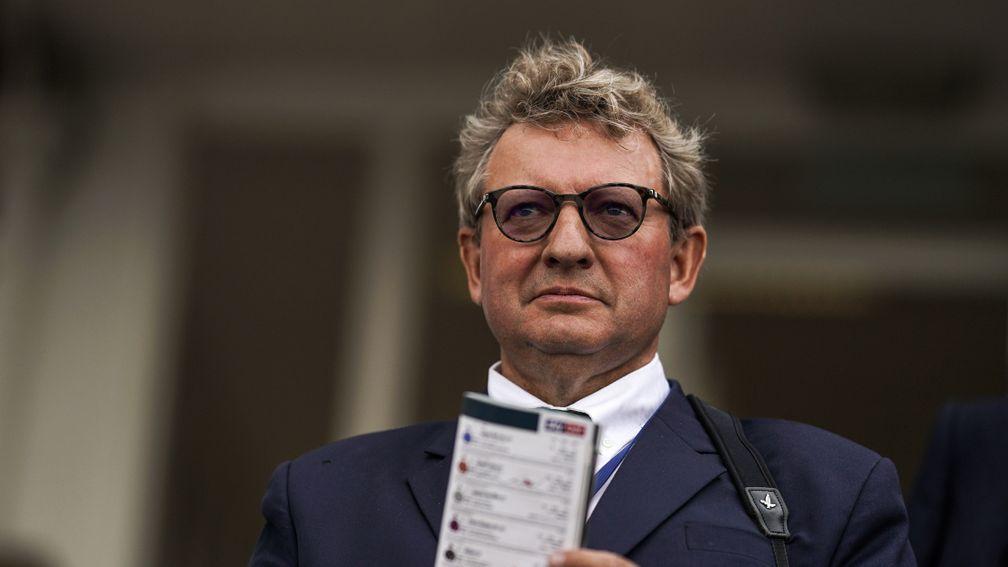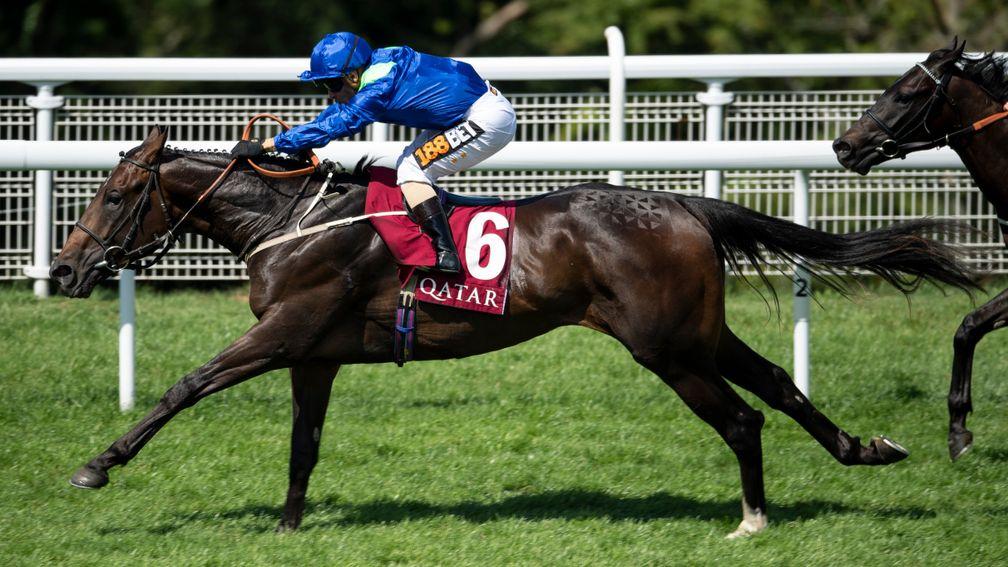- More
Mark Johnston reveals his methods of sourcing a record number of winners
James Thomas hears how the leading trainer unearths his future stars

This article was originally published on September 5, 2018
With the roulette wheel that is the European yearling sale circuit approaching full tilt, owners, trainers and their representatives are entering a stage of the year during which the stakes could scarcely be higher. If the chips are down on the wrong lots during the upcoming auctions, next year's racecourse results will undoubtedly suffer.
Having just last month become the winningmost trainer in the rich and storied history of the Turf, it is fair to say Mark Johnston has not made a habit of following the wrong horse into the sales ring.
Among the hundreds of winners he has signed for at public auction are Group 1 scorers like Bijou D'Inde, Jukebox Jury and The Last Lion.
Last year's intake, meanwhile, includes the stakes winners Victory Command, Main Edition, Natalie's Joy and, most notably, the unbeaten Dark Vision, all of whom boast talent far beyond their relatively modest price tags.

So when Johnston opens his catalogue, what is it that he looks for in a pedigree?
"Racing ability; that's the be all and end all as far as I'm concerned," he says with customary matter-of-factness. If that sounds rather simplistic, it's because Johnston prefers to keep it that way.
"We have pretty basic criteria," he explains. "The first dam must have, as an absolute minimum, a rating over 90 and/or have produced stock rated over 90. We do a lot of homework before we go to the sales, and if we haven't selected a horse on paper beforehand I won't look at it once I'm there.
"Very, very few from the shortlist would be completely rejected once they've been selected on paper," he adds. "I narrowed it down to about 80 at the Goffs UK Premier Sale and only one was of no interest at all. Pedigree decides whether we're interested in the horse and then the physical decides how much we'll be willing to pay for it."
A mighty Vision
Among those to have met Johnston's criteria is Vintage Stakes winner Dark Vision, whose Listed-placed dam had already produced the Listed-placed Al Hayyah by the time the son of Dream Ahead came up for auction.
Despite such firm genetic foundations, Dark Vision required a bid of just 15,000gns to bring the auctioneer's gavel down at Tattersalls last October. In striking that bid, the trainer landed himself a bargain of rare proportions.
"He was very big and heavy and that, put together with Dream Ahead, is no doubt why he could be bought so cheaply," says Johnston when asked to recall his first impressions of Dark Vision.

"He was fat as a yearling and tended to put on weight very easily. He had a great big crest on him and a heavy front and I'm sure that devalued him, but he's actually a very correct, clean-limbed horse and in hindsight he was a steal."
As alluded to, Dream Ahead was finding favour tough to come by when Dark Vision came up for auction - a point the colt appears to have done plenty to rectify - but in Johnston the five-time Group 1-winning son of Diktat has a staunch ally.
"I latched onto Dream Ahead two or three years ago and it's done wonders for us at very small prices," he says. "Horses like Dream Today, Love Dreams, Book Of Dreams, we've had several decent horses by him. They're cheap for what they are - that's why I've bought them.
"We don't make an exception to buy a horse just because of the price. Dark Vision met those criteria at 15,000gns, Victory Command at £6,000 met those criteria. Absolutely across the board, every horse in our yard - from the one that cost one thousand through to the most expensive we've had - all have a well above-average pedigree."
Non conformist
During his record-breaking training career Johnston has relentlessly challenged the status quo, exercising and managing horses in a way that none have been able to replicate with anything close to the same degree of success.
And the same may well be said of his approach to uncovering talent at the yearling sales, as it can seem like Johnston is playing by different rules to those by which many trainers and bloodstock agents abide.
While he is unwilling to compromise on pedigree, Johnston believes the importance of conformation and its impact on racing performance can be misunderstood and is routinely overstated.
"This business of correctness is kind of debatable," he says. "Bloodstock agents have to buy horses to fit the lowest level of knowledge, so the thing that's almost concerning them the most is: does it toe in or toe out or are its knees offset?
"There's been a study done recently that suggests some degree of offset knees actually reduces the risk of injury. It's not the agents' fault, but they're governed by very simple criteria that really have little or no bearing on the ability of the horse.
"It would be unfair to say those buyers can't recognise a nice horse, they can, but they can't buy a nice horse with faults because they fear they can't justify to their customers."
And having worked his way up from the bottom rung of the training ladder, Johnston knows first-hand the complications around buying expensive horses that do not boast flawless conformation.
"When you were buying them for ten thousand it was very simple," he says. "But I've also found it difficult to be brave enough to spend two hundred thousand on a horse with things that I'll have to justify to the owner, but even at that level it's probably still the best way."
Clearly there are limits to the physical imperfections that can be deemed acceptable, but given Johnston managed to win five Group 1s and two Classics with the famously crooked Attraction, it is hard not to find his views food for thought.
X-ray vision
As well as being a trainer of record-breaking skill, Johnston is also a qualified vet, a background that provides ample gravitas when he speaks in somewhat unexpected terms about the increasing influence a certain veterinary practice is having on the sales.
"I'm not a great believer in x-rays," he says, referencing the standard 36 images of a horse's fetlocks, hocks, knees and stifles that often come under scrutiny before a young thoroughbred enters the ring.
"It could even be argued that many of the developmental defects - if you can even call them defects - that are noted on x-rays at the yearling stage are fairly normal things for the fast-growing horse to go through - very few of these things have a bearing on ability.
"You'll find an awful lot more issues on x-rays with the fast-growing horse, and generally the fast-growing horse is often the good one, so being able to see what is normal - or acceptable - for that horse at this stage is clearly an advantage. Being a vet gives me the confidence to back my own judgement."
Always trying
Backing his own judgement has brought Johnston an awfully long way.
Having become the most successful trainer in British racing history, he has grafted his way to a position from where he can count on the backing of several powerful owner-breeders, including various members of the Maktoum family and their associates.
But he has not scaled those heights by standing idle when there is untapped talent to be found at the sales - that would not be the Johnston way.
"I love it but it's very hard on the people at home," he says without a moment's hesitation when asked how he feels about facing another demanding round of yearling sales. "Some people may feel that their time is better used elsewhere but I like to see the horses myself."
And therein lies the root of so much of Johnston's success, as behind the feather-ruffling forthrightness are not only tried and tested methods, but an unquestionable passion to find and train winners.
A tally north of 4,194 suggests he just might be onto something.
If you enjoyed this story you may also be interested in:
Big talent from small money paves the way for Clive Cox's success
Four things we learned at last week's Goffs UK Premier Sale
Revolutionary, independent and feisty: the Scot who did it his way
Published on inFeatures
Last updated
- 'This latest season has underlined his status as a breed-shaping sire' - Tony Morris's take on the 2024 European Pattern
- Broken glass and burst blood vessels at a totes emosh renewal of the December Foal Sale
- All work and no play makes James a dull boy at the Goffs November Sale
- Highs, lows and my Serbian counterpart provide a stern test of sales reporting stamina
- A glitch in the bloodstock matrix as Coolmore throw shade, Mangan messes with my dinner plans and a new master of sales ring satire emerges
- 'This latest season has underlined his status as a breed-shaping sire' - Tony Morris's take on the 2024 European Pattern
- Broken glass and burst blood vessels at a totes emosh renewal of the December Foal Sale
- All work and no play makes James a dull boy at the Goffs November Sale
- Highs, lows and my Serbian counterpart provide a stern test of sales reporting stamina
- A glitch in the bloodstock matrix as Coolmore throw shade, Mangan messes with my dinner plans and a new master of sales ring satire emerges